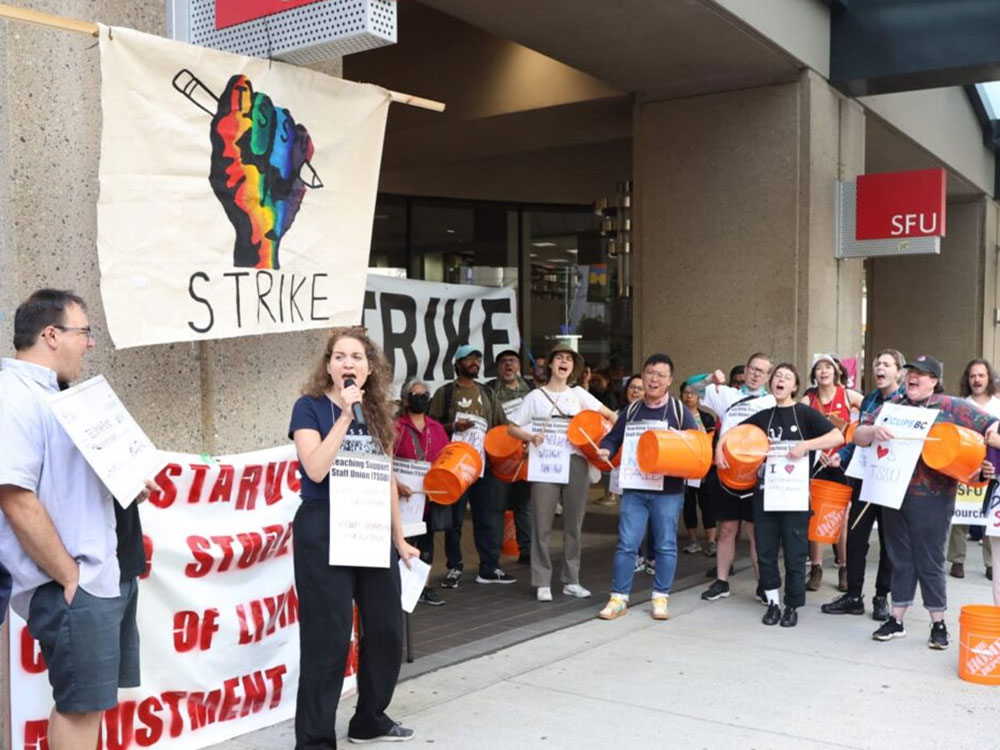Azraf Ahmad started bargaining with Simon Fraser University’s negotiating team at 1 p.m. on Oct. 24.
At 6:20 a.m. the next day, after 17 hours of negotiations, a three-week strike by the school’s teaching staff had finally come to an end.
Ahmad and the Teaching Support Staff Union are touting the newly ratified deal as a victory for teaching assistants, English teachers and sessional lecturers. The TSSU’s membership voted 89 per cent in favour of accepting that deal last week.
But Ahmad acknowledges the union was forced to back down on key proposals over the course of an acrimonious strike that pitted some students and educators against each other.
The union did not get a pay increase above the B.C. government’s standing guideline for public sector workers, as they had aimed.
They won a provision that will give student teachers extra compensation when they teach large classes — but only online courses, not in-person ones. They also agreed on terms for a pension for members, but may have to end up pay a larger share of the costs than they had hoped.
“There were some hard sacrifices we had to make,” Ahmad said.
Both the school and the union must now contend with the aftermath of the strike, which saw allegations of espionage, threats to picketers and public stunts to disrupt classes.
Some union members worry the bad blood between the employer and their union will stain whatever good comes from the new deal.
“My worry is it’s one thing to say yes to a collective agreement. It’s another thing whether they’ve changed their attitude,” professor Amyn Sajoo said of the university.
Sajoo, who teaches about international human rights, is one of many SFU sessional lecturers who works short-term contracts without any permanent job or many basic benefits.
The TSSU’s newest agreement has won workers like him a pension. And the school backed away from its plan to revoke a provision that offers contracted educators like Sajoo a path to a permanent job.
But Sajoo says the new contract also doesn’t make that path any smoother. Sessional lecturers like him still don’t have a guarantee of getting a permanent position, even if they teach a full course load for years on end.
“The huge disappointment is we did not strengthen the provisions,” he said.
Beyond pensions and job security, the TSSU went into negotiations hoping to secure significant pay increases that were above the maximum amount public institutions in B.C. can pay under the government’s labour mandate.
On that front, Ahmad says the union did not succeed.
“That would require some kind of political miracle at this point, I guess,” Ahmad said.
The union’s three-year deal with the school includes a 25-cent an hour flat pay increase in the first year, plus a 3.24-per-cent general wage increase across all positions. That’s followed by a 6.75-per-cent increase in the second year and a 0.87 per cent increase in the last year, which could increase to 1.87 per cent depending on the rate of inflation next year.
That pay schedule is actually slightly less than what public servants at other unions got in deals last year. That’s because the TSSU accepted a slight cut in their final year to help finance the employer’s half of the pension plan.
SFU and other public institutions in B.C. bargain under a bargaining mandate setting out maximum pay increases. TSSU members thus had to agree to that pay cut to finance the pension, which SFU said it was not possible for it to pay under the mandate.
But Ahmad said teaching assistants and other members did win other provisions, including things SFU originally said it could not afford. The school declined to comment on the substance of negotiations.
Ahmad said that includes a provision that will ensure teaching assistants won’t lose scholarship funding when they receive more paid hours.
He said the strike also pressured the school to abandon some concessions it was seeking from the union, particularly when the union hinted it might picket a fall convocation ceremony.
The school pulled those demands from the table, Ahmad said, in exchange for the TSSU letting the ceremony proceed.
He said he was frustrated those breakthroughs didn’t happen in one of the more than 40 negotiating sessions the union had with SFU since their agreement expired early last year.
“They were for sure not upfront with the details on how they costed various items,” he said.
“If all of these things were possible within the mandate all of this time, it would’ve been great to know so months ago so we could have bargained on these effectively,” Ahmad said.
That push-and-pull approach is characteristic of the relationship between the TSSU and SFU, and the grim battle fought between them.
The strike, which included rotating picket lines on SFU’s three main campuses, paralyzed many operations at the university. But some classes still continued, leading to showdowns between professors, students and picketers.
SFU said it received more than 100 “formal strike incident complaints” from students, teachers and contractors.
Ahmad said some of those came from picketers themselves. He said TSSU members were shoved and harassed on the picket line. On some occasions, Ahmad said people sped their cars towards protesters.
Later in the strike, TSSU members documented people who appeared to be watching and filming them. SFU later acknowledged it had hired private security firm Lions Gate Risk Management to monitor its students and faculty on the picket line.
Such tactics are not unheard of. Last year, marine company Seaspan hired the same company to monitor picket lines when a group of striking tugboat captains paralyzed a North Vancouver shipyard.
The school later ended its contract with the company.
As the strike dragged on, the TSSU tried more stunts. A viral video from mid-October showed some union members crash an SFU lecture, beating on orange plastic buckets and yelling into megaphones while calling the instructor a “scab.”
While the school’s faculty association was supportive of TSSU’s strike, there were no rules forcing professors to respect the picket line.
Ahmad acknowledged the incident had occurred. “We could have done it in a slightly different way,” he said, without specifying what that was. He chalked it up to the stress members felt after three weeks on the picket lines. Many TSSU members, he said, were already struggling financially and some could not meet bills after weeks of striking.
“It was a natural consequence of being on picket lines for so long,” Ahmad said.
Nor are the labour movements scraps with SFU over.
The TSSU is taking a second try at unionizing research assistants on campus. SFU had previously voluntarily agreed to let those 1,600-odd workers join the union, but later fought the union in arbitration.
Sajoo himself will face SFU arbitration soon. He is arguing the school violated their agreement after moving him from a rotating lecturer job to a sessional instructor position — a move that included a $30,000 pay cut.
The school’s faculty association is moving its own arbitration case against SFU, arguing the school has unfairly shuffled professors like Sajoo between contracts so they don’t become eligible for longer-term jobs.
Sajoo himself worries he’ll be back on a picket line in a few years time.
“We may have to do this whole thing again,” he said. ![]()
Read more: Rights + Justice, Education, Labour + Industry

















Tyee Commenting Guidelines
Comments that violate guidelines risk being deleted, and violations may result in a temporary or permanent user ban. Maintain the spirit of good conversation to stay in the discussion and be patient with moderators. Comments are reviewed regularly but not in real time.
Do:
Do not: